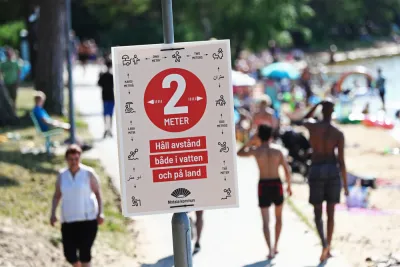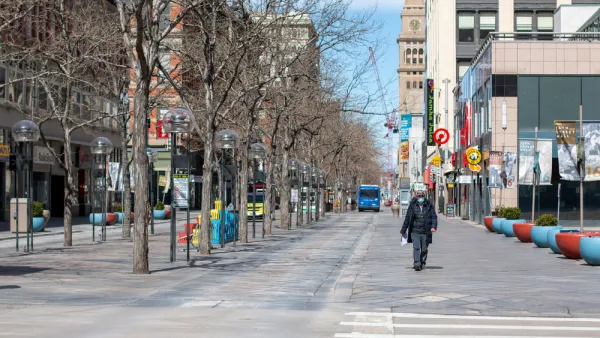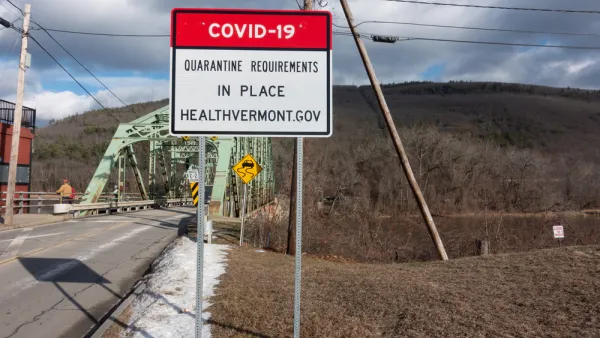The European outlier of Sweden was embraced by American conservatives as an example of a government relying not on heavy-handed business and social restrictions but voluntary compliance by individuals to reduce viral spread. No longer.

Early in the pandemic, Sweden had captured the world's attention by largely allowing people and businesses to make their own decisions in terms of altering behavior to reduce viral transmission. While they paid a steep price in terms of having one of the world's highest Covid death rates, the state epidemiologist remained very popular for not imposing restrictions—that's how our post last May, "The Great Scandinavian Pandemic Experiment," ends.
There is no shortage of articles on the popularity of Anders Tegnell. Regardless of how sustainable the policy he devised turns out to be, he clearly he has won the admiration of most of the Swedish people.
By the summer, infections had plummeted and deaths had plateaued, as Worldometer graphs show. The country was looking like a coronavirus success compared to other European countries where the second surge had begun, observed
Now, though, the question is whether the country’s current low caseload, compared with sharp increases elsewhere, shows that it has found a sustainable balance, something that all Western countries are seeking eight months into the pandemic — or whether the recent numbers are just a temporary aberration.
Sadly, it turned out to be the latter, reports Miriam Berger for The Washington Post (source article). The aforementioned graphs show a steep increase in infections in mid-October, followed by deaths in November. And like another European country that recently enacted stronger coronavirus restrictions, preserving the integrity of the health care system is the driving force.
While public health experts in Sweden have argued that voluntary measures can significantly reduce transmission, the country is now struggling to handle a surge in cases at overstretched hospitals.
“We have a lot of patients being admitted to intensive care units, and there is no sign of that decreasing,” Anders Tegnell, Sweden’s state epidemiologist, said Tuesday, Bloomberg reported. “Unfortunately, the same goes for fatalities.”
Government acts
On Jan. 8, the national legislature known as the Riksdag took action by enacting a temporary law to "enable more communicable disease control measures to be taken to counteract congestion and thus prevent the spread of COVID-19," notes a news release.
If necessary, it will be possible to prohibit public gatherings of a certain size at places to which the public have access and close premises that serve food and drink. The temporary COVID-19 Act is to apply from 10 January until the end of September 2021.
“These measures are far-reaching but they are necessary, not least to alleviate the situation for the health care workers, who are toiling day and night,” Sweden’s Prime Minister Stefan Löfven said on Jan 8, Bloomberg News reported.
Berger ends her piece with the somber appraisal of the country's handling of the pandemic by Sweden’s King Carl XVI Gustaf in his annual end-of-the-year speech last month.
“I think we have failed,” he said. “We have a large number who have died and that is terrible.”
Sweden's cumulative Covid death rate per capita is substantially lower than the U.S., 95 per 100,000 people vs. 117 per 100k, according to Worldometer, but the two nations have essentially the same daily average for the last week of 0.99 deaths per 100k, according to The New York Times.
Related in Planetizen:
-
England Begins Second Lockdown to Protect the National Health Service, November 8, 2020
-
The Great Scandinavian Pandemic Experiment, May 13, 2020
FULL STORY: Sweden passes law allowing coronavirus lockdowns, expects to use it soon

Analysis: Cybertruck Fatality Rate Far Exceeds That of Ford Pinto
The Tesla Cybertruck was recalled seven times last year.

National Parks Layoffs Will Cause Communities to Lose Billions
Thousands of essential park workers were laid off this week, just before the busy spring break season.

Retro-silient?: America’s First “Eco-burb,” The Woodlands Turns 50
A master-planned community north of Houston offers lessons on green infrastructure and resilient design, but falls short of its founder’s lofty affordability and walkability goals.

Test News Post 1
This is a summary

Analysis: Cybertruck Fatality Rate Far Exceeds That of Ford Pinto
The Tesla Cybertruck was recalled seven times last year.

Test News Headline 46
Test for the image on the front page.
Urban Design for Planners 1: Software Tools
This six-course series explores essential urban design concepts using open source software and equips planners with the tools they need to participate fully in the urban design process.
Planning for Universal Design
Learn the tools for implementing Universal Design in planning regulations.
EMC Planning Group, Inc.
Planetizen
Planetizen
Mpact (formerly Rail~Volution)
Great Falls Development Authority, Inc.
HUDs Office of Policy Development and Research
NYU Wagner Graduate School of Public Service




























